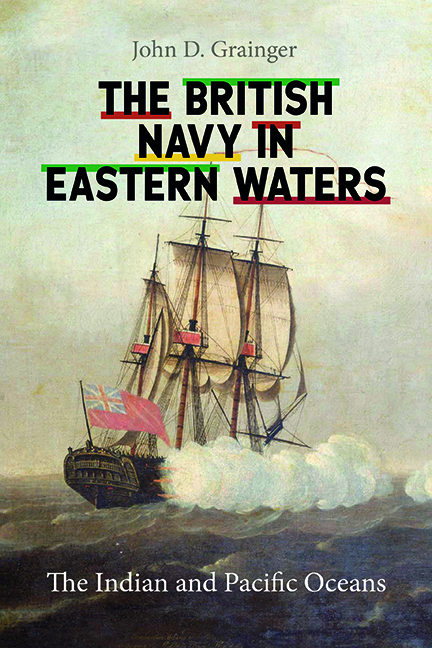5 - British Dominance Established (1748–1763)
Published online by Cambridge University Press: 26 May 2022
Summary
Peace being established in Europe in 1748 did not mean that peace existed outside Europe. In both North America and India, and in the West Indies and the Pacific, contests for local control, domination, and influence went on with scarcely a break – as it did in Europe. The indecisive end of the wars of 1739–1748 meant that, both in the distant lands and in Europe, war by another means went on. In Europe continual rearming, rebuilding of naval forces, and the search for allies produced much activity. In North America the contest between France and Britain culminated in the British attacks on the French fort at Fort Duquesne in 1754, in the West Indies the clandestine infiltration and unofficial colonisation of the Neutral Islands by the French began as soon as the war ended; the Pacific had to wait some time to see evidence of the contest, but Anson's voyage had stimulated academic work on the ocean, and at least two compendiums detailing past explorations and discoveries came out in the period between the wars (1748–1756); these emphasised the gaps in knowledge and, by implication, the possibilities of discoveries and so the extension of national trades, influence, and conquests.
There were two separate wars being waged by the Company in India in this period, as before: one was on the west coast, from Gujarat to Malabar, where the enemies were the small communities of predators – ‘pirates’ – from the small coastal states, with the Maratha state in the background; the other was on the Coromandel coast where the enemy was the French East India Company, a contest which involved a variety of Indian powers, notably, as before, the Nawab of Arcot and the Nizam of Hyderabad, again with the Marathas in the background, and the Sultan of Mysore as well. Until 1755–1756 there was virtually no connection between these wars on opposite coasts, other than the largely disengaged and partly disunited Marathas, but then a brief connection came into existence, though it was only personal.
In Coromandel the governor of Pondicherry, Joseph Dupleix, seized the moment when Admiral Boscawen took the Royal Naval ships away to continue his work of expanding French influence throughout southern India (following, as it happened, a similar move by the British to gain influence in Tanjore).
- Type
- Chapter
- Information
- The British Navy in Eastern WatersThe Indian and Pacific Oceans, pp. 83 - 100Publisher: Boydell & BrewerPrint publication year: 2022



